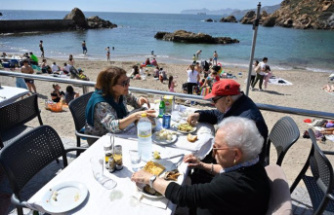The competition of the express regional trains to be precise. As of 1 December, the regions will have the possibility to organize tenders on such or such a line of express regional trains (TER). This measure, provided by railway reform adopted last year despite a spring disrupted by a 36-day strike of the workers, concerned, among others, employees of the SNCF, which unions have called a day of national demonstration Tuesday 4 June. But many regions are already since several months (even years) in the starting blocks, ready to launch this competition in the rail. They hope thus to improve their service to the regional transit rail and enjoy a lower cost of operation, today at their expense. This opening to competition of the TER, which is mandatory from 2023 onwards, will be, however, very gradually. The first TER "liberalised" should not be circulated before the end of 2020. Where are the areas and how to deal with this competition?
" READ ALSO - Elizabeth Bollard: "The competition will be a stimulus for the SNCF"
• The Southern region wants to combat the delays to repeat
In the Southern region (ex-Provence-Alpes-Côtes-d'azur), the president of the region Renaud Muselier (LR), sees only the "profits" to the liberalisation of regional trains. "The SNCF, today provides a service that is expensive and random in the PACA region. We have the worst service TER of France. Only 80 % of trains to our region arrive on time, and 10 % are cancelled so that we pay very expensive, 1 million euros per day" for the operation of the rail network. Between aging infrastructure, a territory weakly meshed and delay rate to be high, this region is indeed a figure of bad student according to the last report of the Authority of the quality of service in the Transports (AQST). The opening up to competition should help ensure a "reliable, to the benefit of users who will benefit from a better quality of service' hopes to the president of a region that promises that "no station or line will not be closed" and that "the prices will not increase".
Two lines very popular, have already been selected for this competition. This is the link of the TER Marseille-Toulon-Nice, which represents a quarter of trips in the regional trains, is the 75,000 - (100.000) users per day ; and the line blue Star (Cannes-Grace, les Arcs Draguignan-Vintimille, Cannes-Nice-Vintimille, Nice-Tende) that carries 50.000 users daily, including many tourists. For the first, however, it will be December 2022 for the project to materialize and December 2024 for the second.
• The region Is hoping to save small lines
Other region to have initiated the opening of the competition of their TER, the Great Is. Its president, Jean Rottner sees a "great sign given to rural areas". In fact, he has decided to take advantage of the opening to competition of the lines b, to reopen the line Nancy-Vittel-Contrexéville, closed for 2016 and today served by buses. The tender will include both the operation of the railway line but also the work of renovation of infrastructure and its maintenance. A second line will be opened to competition: one that connects Epinal-Saint-Dié-des-Vosges mountains-Strasbourg (portion currently closed) and Sélestat-Molsheim-Strasbourg, as well as road services (bus) on the same perimeter. The tender for the second line will focus "simply on the functioning of the lines and rail and road, says the president of a region. The equipment will be refurbished prior to the opening to the competition." "These small lines that we reopen are genuine demands of our fellow citizens to the daily" adds Jean Rottner, who sees there also the opportunity to reduce costs for the region. Side calendar, the first trains are expected to circulate in late 2020, early 2021.
• The Hauts-de-France want to force SNCF to "move around"
The region Hauts-de-France is also on the rails of the liberalization of its lines TER. In the eyes of its president, Xavier Bertrand (ex-LR), "open competition is the only way to move the SNCF, which must review its organisation and who, with all TGV , has not made the necessary investments to where they are most needed". Between delays, cancellations, breakdowns...the quality of the service "deteriorated significantly," says Xavier Bertrand. According to him, the goal is not to "make savings" for the region, but"to improve the service to users" whereas each day, approximately 110,000 people used the TER of the Hauts-de-France. He promises not to close "any station and any line".
" READ ALSO - The region Hauts-de-France plays his TER
The region has defined ten batches of rows different that could potentially be affected, as the line Beauvais-Paris, Paris-Amiens, Paris-Saint-Quentin or lines around Lille. This represents 10% of the regional network. Calls for tenders should be launched in the spring of 2020, for awarding in October 2021 and an early movement of trains at the end of December 2022, beginning 2023. In the meantime, the elected officials of the region have seized the Arafer - the regulator on the rail, in order to enjoin the railway to convey the information they consider necessary for the opening up to competition. "We need to know all that relates to the lines, and the condition of the rolling stock, the number of officers and their profile, so that interested operators have in mind the wage bill", has detailed Laurent Vercruysse, director-general of services. "Today, we do not have information," he says.
• The regions of Occitania and Brittany, resist
If most of the regional councils are tempted to take the path to the private management of part of their TER, the two regions do not want to open up to competition from December 2019: the Occitania and Brittany. The president of the region of Occitania-the Pyrenees-Mediterranean, Carole Delga (PS), has rather made the choice of the incumbent operator, has renewed last year's commitment concluded with the SNCF until 2025. For her, "the opening up to competition of the TER will not solve the delays, the cancellations, the trains are crowded, she said. We have seen the disastrous effect that this has had in England, with a strong inflation in the price of the tickets." Britain is not in a hurry. Theoretically these regions have time. From December 2023, the competition will become compulsory. But the most resistant to change will be able to maintain at home the myopole of the SNCF, without any call for tenders, until the end of 2033.
" READ ALSO - Guillaume Pepy presents the "new SNCF" 2020
"It's a good thing for the entrants and the historical operator that this competition should be done gradually", writes Michel Neugnot, president of the Commission for mobility of Regions of France. According to him, the SNCF has everything to gain. "At the beginning, the historical operator, the risk of losing market share, but will recover very quickly because the market is going to increase," he predicted. "And then, this is not a competition as another," he recalls. In the framework of a form of delegation of service, with precise specifications, the regions will continue in effect define the conditions of the connections and frequency, as well as the rates. Prospective new operators will operate then all of the lines that will be assigned for a maximum duration of ten years. The regions may also decide to continue to deal directly with the SNCF, which will, in the same way as the other operators, respond to different calls for tenders. In all cases, the operator will try his luck.
Date Of Update: 06 June 2019, 00:00












